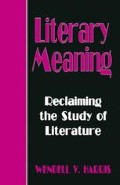Abstract
No essay of which I am aware so accurately sums up the ethos of contemporary departments of literature as the first chapter of Jonathan Culler’s Framing the Sign: Criticism and its Institutions. If there has been any change in the discipline in the five years since the essay appeared, it has been in the nature of intensification of the situation he describes. And yet thoughtful reading of that essay is likely to induce schizophrenia. Evidently intended to set the stage for the remainder of the volume, the chapter provides a valuably concise history of the development and, especially, expansion of the study of literature in American universities in the twentieth century. A quick reading suggests that Culler is attempting to give a relatively objective account, one that does not omit cross-currents and conflicts. Nevertheless, the essay as a whole is an apologia for, even a celebration of, literary departments as they are. Are university teachers of literature as a whole so satisfied with themselves? Should they be?
Every now and then, a sense of the futility of their daily endeavors falling suddenly upon them, the critics of Christendom turn to a somewhat sour and depressing consideration of the nature and objects of their own craft. That is to say, they turn to criticizing criticism. What is it in plain words… How far can it go? What good can it do?
H. L. Mencken, “Criticism of Criticism of Criticism,” 3.
But dissertations have to be submitted, and (where promotion is at stake), books have to be published. You can spread your insights thin (many a long-drawn-out thesis could be compressed into a tolerably interesting article). You can choose an unexplored subject — and as time goes on, those that remain are bound to be more and more trivial. Or you can strain after false originality. One way or another, the books that result, and which multiply at an increasing rate, are likely to mean as little to posterity as most nineteenth-century collections or sermons do to a modern reader. (312)
John Gross, The Rise and Fall of the Man of Letters 312.
Access this chapter
Tax calculation will be finalised at checkout
Purchases are for personal use only
Preview
Unable to display preview. Download preview PDF.
Author information
Authors and Affiliations
Copyright information
© 1996 Wendell V. Harris
About this chapter
Cite this chapter
Harris, W.V. (1996). Publishing the (Highly) Perishable. In: Literary Meaning. Palgrave Macmillan, London. https://doi.org/10.1007/978-1-349-24412-6_10
Download citation
DOI: https://doi.org/10.1007/978-1-349-24412-6_10
Publisher Name: Palgrave Macmillan, London
Print ISBN: 978-0-333-64015-9
Online ISBN: 978-1-349-24412-6
eBook Packages: Palgrave Literature & Performing Arts CollectionLiterature, Cultural and Media Studies (R0)

